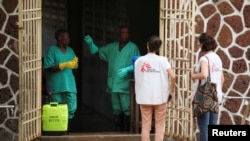The World Health Organization says vaccinations are expected to begin this week, perhaps as early as Wednesday, to help stem the latest Ebola outbreak in the eastern Democratic Republic of Congo. WHO estimates put the number of confirmed and probable cases of Ebola at 43, including 34 deaths.
The WHO says the same expert team that led the the vaccination program during a recent Ebola outbreak in Congo's Equateur province will be deployed to the cities of Beni and Mangina in North Kivu province, where Ebola was detected last week.
It says vaccinations in North Kivu will follow the same ring vaccination method. That means people most at risk of infection, such as health workers and first responders, will be vaccinated first. They will be followed by family members, neighbors and other people identified as having come in contact with Ebola victims.
Tracing contacts could be dangerous in North Kivu's highly insecure environment. WHO spokesman Tarik Jasarevic says some of the people exposed to the deadly Ebola virus might be living in conflict zones and armed guards may have to be used to protect the health workers.
He tells VOA that WHO personnel will have to work with U.N. peacekeeping forces known as MONUSCO.
“For example MONUSCO is sending, already sent some security vehicles, in haste, to Beni on August 5th and we may have to use these sort of vehicles," Jasarevic said. "But again, at this stage, we are really trying to do what is needed to be done. So, the recommendation from the SAGE (Strategic Advisory Group of Experts) is to use ring vaccination.”
Jasarevic says the World Health Organization and partners are working non-stop to contain and stop this latest outbreak of Ebola as quickly as possible. He says 30 WHO staff members have been deployed to the area and more experts are on the way.
He says contact tracing has begun in affected zones. While more than 900 contacts have been registered in Mangina, he says this operation must be rapidly strengthened.
He notes the cost of responding to this disease is likely to be significant, especially in view of the security situation.




